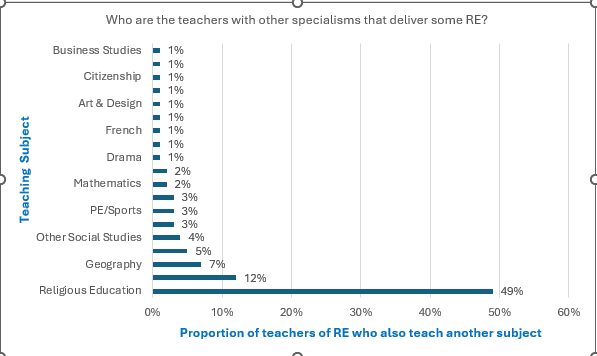Who are the teachers with other specialisms that deliver some RE?

Through a parliamentary question last year, NATRE discovered that 51% of teachers of RE spend most of their timetable teaching another subject. We wanted to find out which subjects these teachers taught, as between them, they make up more than half of the RE workforce.
On average, teachers of RE spend about half (49%) of their teaching time delivering RE. The latest data from November 2023 shows that the teachers who teach some Religious Education (RE) also teach a variety other subjects. It is worth noting that to count as a teacher of RE, an individual might teach just one lesson of RE or an entire timetable to RE.
So what subjects do the teachers deliver if they only teach a partial RE timetable?
- 12% of their time was spent teaching History
- 7% on Geography
- 5% on English
- and smaller amounts on PSHE, PE, and many other subjects
This shows that most RE is taught by non-specialists—teachers who split their time between RE and other subjects. It highlights the need for more RE specialist teachers, especially if we want high-quality learning in this subject.
It is not surprising that the most significant groups of teachers that teach RE as an additional subject are those that also teach Humanities subjects such as History and Geography. However, we should not under-estimate the importance of subject and pedagogical knowledge required to be a confident and well-equipped teacher of any subject. Teachers of modern foreign languages and science often cite the need to teach outside their specialism as a reason for leaving the profession and the same is true for RE.
This characteristic of the RE workforce, creates many challenges. Firstly, most of these teachers with other specialisms have not trained to teach RE or received professional development in the subject. We have also found that in schools delivering RE in this way, changes are often made to the curriculum to mitigate the lack of RE subject knowledge of those delivering RE. This reduces the standard of the Religious Education experienced by pupils. Without subject specific training, it is unlikely that most teachers would be able to plan and deliver a rigorous RE curriculum or answer pupils’ questions in the way they do in lessons for their main subject.
NATRE proposes that:
- the value of bursaries for trainee teachers of RE be increased in value to the level offered for other shortage subjects
- subject knowledge enhancement grants be reinstated for trainee teachers of RE that need them to be accepted onto a course
- where schools have no option other than to use TWOs to deliver RE, the government should fund subject knowledge enhancement (SKE) grants for TWOs to help raise standards.
The TWOs course would need to be suitable for experienced teachers and cover both pedagogical and substantive knowledge. However, there are potential economies to be made between the SKEs provided for those that need a course to be accepted on to RE Initial Teacher training and one for those teachers with other specialisms, who have not been trained to teach religious education.
| Notes: |
| 1. Religious Education teachers are any teacher timetabled to teach the subject for any period in a typical week in November and do not necessarily have a specific post-A level qualification. As this data does not cover a full academic year of teaching, it will not account for any variations across the year in teaching |
| 2. Teachers were counted once against each subject and year group they taught, irrespective of the time spent teaching. Therefore, teachers may be counted against multiple subjects and year groups so sums of these categories may be greater than the number of secondary school teachers. |
Deborah Weston
Research Officer
June 2025
Press Information
About NATRE
NATRE, the National Association of Teachers of Religious Education, is the leading subject teacher association dedicated to supporting and empowering professionals in the field of Religious Education (RE), Religious Studies (RS) and religion and worldviews education.
Stay in Touch
Be the first to hear the latest news and updates